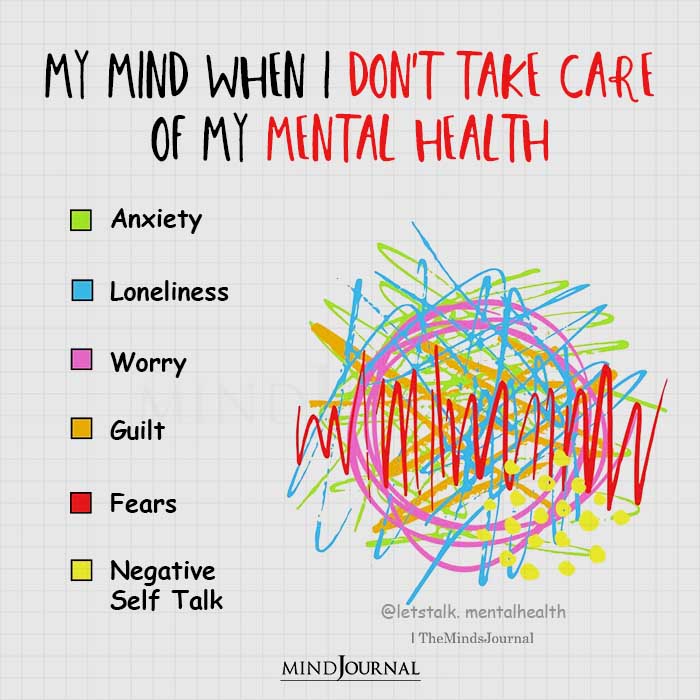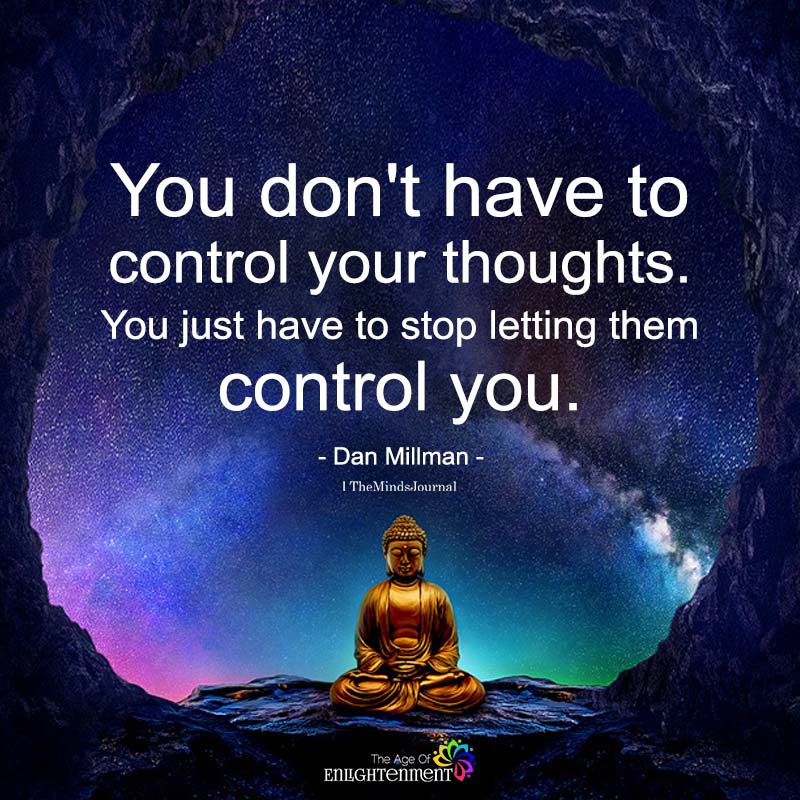Do you master your mind? Or are you a slave to it? Before we head out and conquer the world and earn the right to call ourselves successful, we need to first take a step back and conquer ourselves.
But the sad reality is that most of the time we are a slave to our minds, instead of controlling our mind. Although we may love to believe that we are in charge of our thoughts, we lie to ourselves. Anxiety, overthinking, uncontrollable anger, and lack of emotional control are all clear and present signs that we do not control our minds.
When your emotions and behaviors are controlled by intrusive thoughts, you are no longer the master, my friend. But a slave to your own mind.
Related reading: Everything Is Energy And We Control It With The Power Of Thoughts

Mind matters: Master or slave?
“He who conquers others is strong; he who conquers himself is mighty” – Lao Tzu
Do you let your mind take charge of your life or do you use your mind to build the life you want? Here are a few ways to know if the mind is your master or the other way around –
1. Inability to think differently
Can you alter the way you think when the situation demands it? Or do you get stuck in preconceived notions? If you do not have the ability to change your thought patterns, then it is unlikely that you will master your mind. But if you can change your mindset when needed, then you will not become a slave to your mind.
By becoming aware of your thoughts, you can transform negative thoughts into realistic ones that can empower you to make better decisions in life.
Known as cognitive reframing, this psychological paradigm shift can help you change old thought patterns that do not serve you any longer and develop a more positive and new mindset.
When you identify flawed thought processes and alter how you observe and analyze ideas, emotions, experiences, situations, and events, you challenge your mind and start controlling it. Questioning your thoughts is the very first step needed to master your mind.
Related reading: Change your Mind to Change your Life
2. Acting on autopilot mode
Do you feel like going through the motions without putting in the conscious effort? Do you want to get things done without thinking about it as you are used to it? If yes, then this is one of the signs your mind is your master.
Living life on autopilot mode means that you want to engage in a comfortable and relaxed mode of thinking. And you allow your unconscious or subconscious mind to take over your actions.
This can be your way of dealing with stress, anxiety, or depression, especially when you feel burnt out or don’t have the tools to deal with it. If you feel sapped of energy and unable to deliberately function in daily life, then your mind will revert to autopilot mode.
Related reading: How To Practice Emotional Control: 6 Science-Backed Tips
If you lack control over your thoughts, emotions & desires, and act impulsively most of the time, then it can be difficult to master your mind.
In fact, studies have found that high levels of impulsivity and having an escapist motivation can lead to poor emotion regulation. We will undoubtedly become a slave of our mental habits when we are not aware of our instincts and natural drives.
3. Not being mindful about your thought patterns
Do you know how you may react in a specific scenario? Are you aware how your mind works and how your thoughts affect your emotions? If you lack awareness about your own thought patterns, then I doubt you will be able to master your mind.
Our thoughts directly affect our behaviors, actions, and reactions. Negative thoughts can lead to a pessimistic attitude and lower your self-esteem and confidence. However, being self-aware of your thoughts enables you to self-evaluate and better understand your mind.
You become free from damaging cognitive biases and it helps you develop different perspectives. Not only it enables you to manage your emotions better, it also helps you strengthen relationships. All this happens when you master your mind.
Related reading: 7 Daily Habits To Help You Practice Mindfulness Effectively
Here are some other ways to know if the mind is your master or if you are the conqueror of your mind –
4. You blindly believe all your thoughts
When your decisions, behaviors, and actions are dominated more by your thoughts than facts, it means that the little voice inside your head has made you its slave.
5. You pay less attention to your intuition
You know your mind is your master when you make choices and decisions based on what you think rather than what your gut feelings tell you. But when you consider your intuitive feelings along with logical reasoning, you master your mind.
Related reading: How To Strengthen Your Gut Feeling
6. You look for a deeper meaning in everything
If you look for an underlying, more spiritual or psychological meaning behind things, you will always be running after explanations that will never quench your thirst for meaning.
But when you accept things as it is, you can focus your energy more on things that are more important to you, than on seeking knowledge just because your mind needs to know more. This is how you master your mind.
Related reading: 4 Questions To Ask Yourself Every Morning To Get Control Of Your Mind
The power of your mind

For a long time, I was not sure if I was a master of my mind or a slave to it. Primarily because I was not sure what I was supposed to master my mind with. Our brain controls our physical and cognitive functions.
So what am I supposed to control my mind with? Every time I a self-help guru or a motivational speaker would suggest “master your mind”, I felt lost and confused. And perhaps, that is one of the biggest problems most of us deal with.
We are not sure that we are slaves to our minds and if somehow we manage to lift the veil of illusion that our mind creates to control us, we don’t know how to master our minds.
We believe what our mind tells us, we do what it instructs and follow its every command. We are prisoners of a reality created by our minds where facts are distorted into ‘truths’ that serve our mind’s purposes. But this is not the truth nor the reality, just stories that our minds feed us.
This is why some people are so hard to convince that they are wrong about certain things. Even when they are countered with contradictory evidence and facts, they become slaves to cognitive biases and hold onto their false beliefs even strongly.
Related reading: Mushin: How The ‘No Mind’ State Can Help You
How can you master your mind?
And what do you master your mind with?
Consciousness and willpower.
Your consciousness is more powerful and stronger than your mind. Your intellect, awareness, and determination can offset the influences of your mind and enable you to eventually master your mind.
However, when we are not aware of the impact our mind has on us or when we have weak intellect and willpower, we become slaves to our minds. The individual self or the consciousness takes a backseat, and the mind drives us through thoughts, actions, and behaviors that are often inappropriate and unhelpful.
However, other than your consciousness, several other factors may also play a crucial role in helping you master your mind. Factors like age, time, life experiences, friends and family, social circle, career accomplishments, failures, media, etc. Another crucial factor that affects our mind, thoughts, and behavior is the food we consume.
Apart from these, taking a step back from your thoughts and bringing your focus into the present moment can also help you to reflect and gain more control over your thoughts.
Stepping back from your thoughts allows you to gain your power back. It empowers you to escape from the trap of being a slave to your mind and gain the ability to control it instead.
Related reading: 14 Books To Help You Gain Mastery Over Your Mind
Being conscious about your thoughts will help you avoid clinging to intrusive thoughts and intentionally detach from unhealthy mental perceptions and interpretations arising from your unconscious mind.
How to control your mind
There are several ways and strategies that can help you to master your mind and control unwanted, intrusive thoughts. Here are some of the most helpful ways that can enable you to master your mind and weed out unproductive thoughts –
1. Identify triggers of intrusive thoughts
Certain triggers coax our minds and keep them from focusing on productive thinking. Certain past experiences, traumatic events, relationships, places, situations, people, or even a specific date can trigger negative thoughts and difficult emotions. This can lead to stress, sadness, anxiety, fear, anger, and even vengeance.
If you find specific triggers challenging to deal with, then it is crucial that you learn to identify them before they invoke negative reactions within you.
Once you know your triggers, decide what you want to do about and how you wish to deal with them. If you are unable to deal with these triggers, then try to avoid them. This helps you manage your thoughts better and stops you from becoming a prisoner to your mind.
Related reading: 15 Art Therapy Exercises to Banish Anxiety and Channel Your Emotions
2. Be mindful of the present moment
The human mind is always stuffed to the brim with racing thoughts and most of them are intrusive. Instead of engaging with each and every thought that arises in your mind, pause for a while and focus on the present moment.
Pausing for a moment will allow you to gather your thoughts, acknowledge your emotions and understand yourself better.
Self-awareness is the key to observing and being aware of your thoughts & emotions. By practicing mindfulness, you will learn that acknowledging negative thoughts is crucial for gaining control over your mind. It is only by embracing all your thoughts and feelings can you truly be mindful of the present moment.
So if you find yourself becoming a slave of your thoughts, bring your attention to the present moment, regardless of what you may be doing. One of the best ways is to focus on your breath.
Related reading: How Mindfulness Can Improve Your Overall Mental Health
3. Breathe deeply

Master your mind with deep breathing. According to Buddhism, our mind always needs some activity to engage in and so when we try to silence it, our mind tries to remain active by conjuring up ideas, thoughts, memories and worries that race through our mind.
These thoughts keep us enslaved and prevent us from experiencing mental peace. This is known as the ‘monkey mind’. One 2018 study explains “Monkey mind is a metaphor for the mind’s natural tendency to be restless— jumping from one thought or feeling to another, as a monkey swings from limb to limb.”
However, the researchers believe that tranquility and stillness of mind can be developed “through systematic mental training involving a combination of concentration, nonconceptual observation, and discernment.”
Deep breathing can help us calm this monkey mind, let go of all negative, intrusive thoughts and relax. By consciously focusing on your breath, you will give your mind a task to focus on. This is how you control your mind.
Deep breathing, also known as abdominal breathing or diaphragmatic breathing, can help you reduce stress & anxiety, relax tense muscles, improve focus and sleep better. Breathing deeply is a great strategy to gain clarity of thoughts and deviate from uncontrolled thoughts for the time being.
Related reading: How to Control Your Emotions When They Are Out of Control
4. Meditate
Meditation is not just for monks and individuals interested in spirituality. Meditation can also have a lot of psychological benefits that can enable you to master your mind, instead of being a slave to it. This ancient technique helps us develop awareness and be mindful of the present moment.
Meditation is the answer to our monkey mind trying to turn us into its slave. It alters our consciousness, improves attention & concentration, develops acceptance, and teaches us to let go of things that bother us. It can also reduce stress, anxiety, worries, and fears.
By creating a deep state of relaxation, meditation can help you experience a tranquil mind. Daily practice will empower you to overcome the train of jumbled thoughts that create stress by making your mind feel crowded and chaotic. Meditation also improves your physical, mental, and emotional well-being.
Sit down in a quiet place, close your eyes and focus on your breath. Do not try to avoid any thoughts that arise naturally. Instead, simply acknowledge them and let go. Keep your focus on your breath and practice for at least 10 minutes daily.
Related reading: The Beginner’s Guide To Meditation
Here are some other ways to master your mind –
- Accept unwelcome thoughts
- Encourage and develop positive thoughts and emotions
- Avoid overthinking and rumination about past events
- Try to gain new perspectives
- Practice visualization and guided imagery
- Learn stress management and relaxation techniques
- Practice journaling and write down your thoughts
- Consult a mental health professional or a therapist
Master your mind, don’t be it’s puppet

The mind is a terrible master, but it makes a great slave. Instead of letting life’s situation dictate and dominate your life, start to live intentionally. When you learn to master your mind, you gain control over how you feel and what you do. You react better to stressors and feel grateful for what you have.
Although controlling your mind can be really difficult, in the end, it will be more than worth it. You will be more resilient, happier, patient, and calmer. Being a master of your own mind and developing your consciousness will transform your entire life.
Related reading: 4 Ways To Unlock and Reprogram Your Subconscious Mind










Leave a Reply
You must be logged in to post a comment.